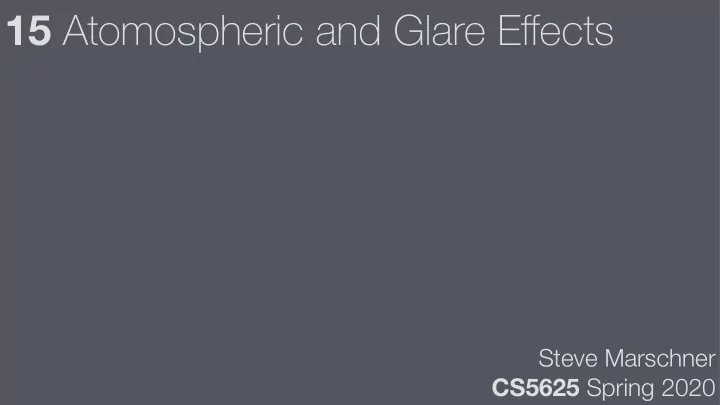

15 Atomospheric and Glare E ff ects Steve Marschner CS5625 Spring 2020
Plan Physics of the Air Bibliography • scattering due to gases • Nishita et al., “Display of The Earth Taking into Account Atmospheric • scattering due to aerosols/particles Scattering,” SIGGRAPH 1993. • distribution of atmosphere • Preetham, Shirley, Smits, “A Practical Analytic Model for Daylight,” Atmospheric Phenomena SIGGRAPH 1999. • sunlight • Hosek & Wilkie, “An Analytic Model • skylight for Full Spectral Sky-dome • aerial perspective Radiance,” SIGGRAPH 2012. • clouds Computational Models • ray and path tracing • analytic approximations
pure air 256 exceptionally clear 128 64 very clear 32 16 clear R m (km) 8 light haze 4 haze 2 thin fog 1 0 . 5 1 2 4 8 16 32 64 Turbidity Preetham, Shirley, & Smits SIGGRAPH 1999
θ v θ s W N γ φ s S E Preetham, Shirley, & Smits SIGGRAPH 1999
42°, T=1 .5°, T=1 .5°, T=6 .25°, T=7 Hosek & Wilkie CG&A 2013
(a) T = 2 (b) T = 4 Hosek & Wilkie SIGGRAPH 2012 (c) T = 6 (d) T = 8
Obtaining Reference Data
Result: Raw Data
Empirical analytic sky models CIE Standardized sky model • parameters A…E are tabulated for various conditions and solar elevations Equations: Hosek & Wilkie SIGGRAPH 2012 2 )+ E cos 2 γ ) F CIE 2003 ( θ , γ ) = (1+ Ae B/ cos θ )(1+ C ( e D γ − e D π (2) • Preetham provides empirical analytic functions for these coe ffi cients in x, y, Y Hosek extended sky model B cos θ +0 . 01 ) · ( C + De E γ + F ( θ , γ ) =(1 + Ae + F cos 2 γ + G · χ ( H, γ ) + I · cos 1 2 θ ) 1 + cos 2 α χ ( g, α ) = 3 (1 + g 2 − 2 g · cos α ) 2 • They provide tabulated values for A…I, fitted to simulation; models turbidity quite a bit better.
Sky Colour Patterns (sunset)
(a) Sunrise (b) α = 0 . 1 T=3 (e) Daytime sky (f) α = 0 . 9 T=7 Hosek & Wilkie SIGGRAPH 2012
Aerial perspective Attenuation removes light from the viewing ray • more blue removed, resulting in warmer colors Inscattering adds light to the viewing ray Preetham, Shirley, & Smits SIGGRAPH 1999 • more blue added (usually), resulting in blue contribution (away from sunrise/sunset) Computing both requires integration along ray • density, sun radiance change with h • analytic approximations used for fast performance
T=2 T=6 morning evening Preetham, Shirley, & Smits SIGGRAPH 1999 T=2 T=10 evening overcast
Scattering in the eye Scattering also happens inside the eye Spencer, Shirley, Zimmerman, Greenberg SIGGRAPH 1995 Causes “flare” from bright sources to add with other parts of the image Amount of flare • depends on angle between the source and the pixel receiving flare • angle ~= image-space distance, so model as a convolution
Bloom and lenticular flare Spencer, Shirley, Zimmerman, Greenberg SIGGRAPH 1995
Recommend
More recommend